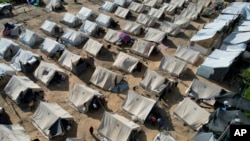A much-needed humanitarian aid convoy that was expected to enter the Gaza Strip from Egypt through the Rafah Crossing on Friday is now expected to be delayed for at least a day.
U.S. officials cited road repairs as one reason for the delay of the convoy, slated to bring vital medical supplies, food, water and other necessities to Gaza.
The territory has suffered nearly two weeks of airstrikes from Israeli forces responding to the surprise attack by Hamas militants in Israel on Oct. 7.
The bombing has left hundreds of thousands of Gaza residents homeless and in need of assistance. U.S. President Joe Biden struck the deal between Israel and Egypt to allow some aid into Gaza during his visit to Israel this week.
U.N. Secretary-General Antonio Guterres said Thursday that limited humanitarian assistance to Palestinians living in Gaza is not enough.
"It is not one small operation that is required; it is a sustained effort to deliver humanitarian aid to the people of Gaza," Guterres told reporters in Cairo, where he has gone to oversee U.N. preparations for the aid operation. "In plain terms that means humanitarians need to be able to get the aid in and they need to be able to distribute it safely."
The U.N. chief spoke at a joint press encounter with Egyptian Foreign Minister Sameh Shoukry. Egypt controls the Rafah border crossing into Gaza, which has taken on critical importance in international efforts to get relief supplies into the coastal territory.
Guterres said Rafah is a "lifeline" for Gazans.
The Hamas-controlled Gaza Strip has been under a complete siege by Israel since its militants carried out a deadly terror attack inside Israel on Oct. 7, killing 1,400 Israelis and abducting nearly 200 more to the Gaza Strip.
"For nearly two weeks, the people of Gaza have gone without any shipments of fuel, food, water, medicine and other essentials," Guterres said. "Disease is spreading. Supplies are dwindling. People are dying."
Guterres called this week for an immediate humanitarian cease-fire and repeated his appeal in Cairo, where Egypt’s foreign minister echoed the urgency for it.
"I’m hailing the call launched by his excellency the secretary-general to pause immediately and to cease fire in order to de-escalate any kind of conflict, and to stop and to staunch the bloodbath of the Palestinian people," Sameh Shoukry said.
U.S. President Joe Biden said Wednesday in Tel Aviv that Israel has agreed to allow limited humanitarian assistance to begin flowing into Gaza from Egypt, with the caveat that it would be subject to inspections, and that it should go to civilians and not Hamas.
Reports said that about 20 aid trucks would be part of the initial convoy, though it was not clear if any U.N. trucks would be a part of that agreement.
In the meantime, the United Nations has flown in more than 3,000 tons of supplies that are ready to go through Rafah to southern Gaza as soon as it is safe to do so. The World Food Program has 1,000 metric tons of ready-to-eat and canned food, enough to feed nearly half a million people for one week, at Rafah or on the way there.
Israel has carried out several airstrikes on Rafah in recent days, however, damaging the crossing and making it unsafe for humanitarians. They must wait for diplomats to secure the necessary security guarantees from Israel.






